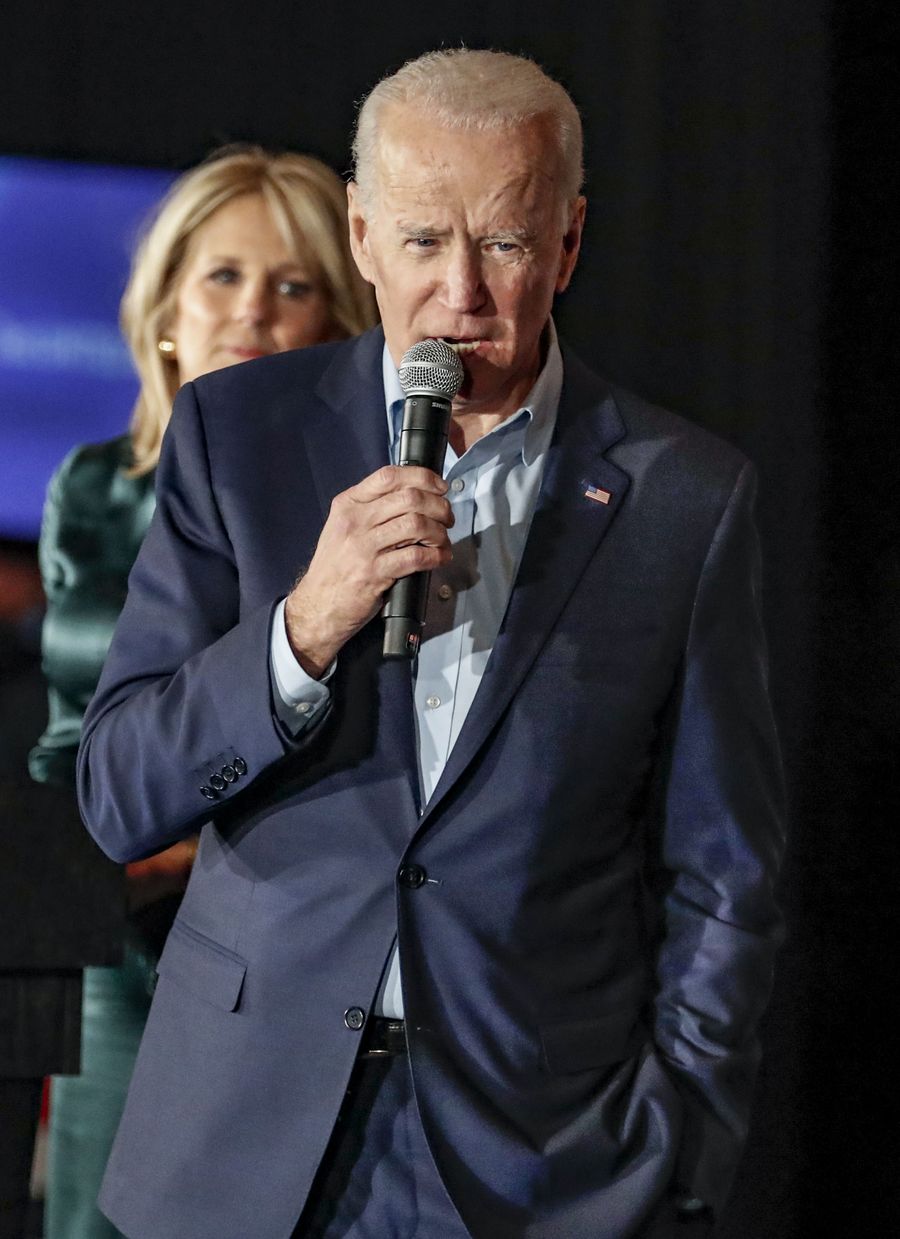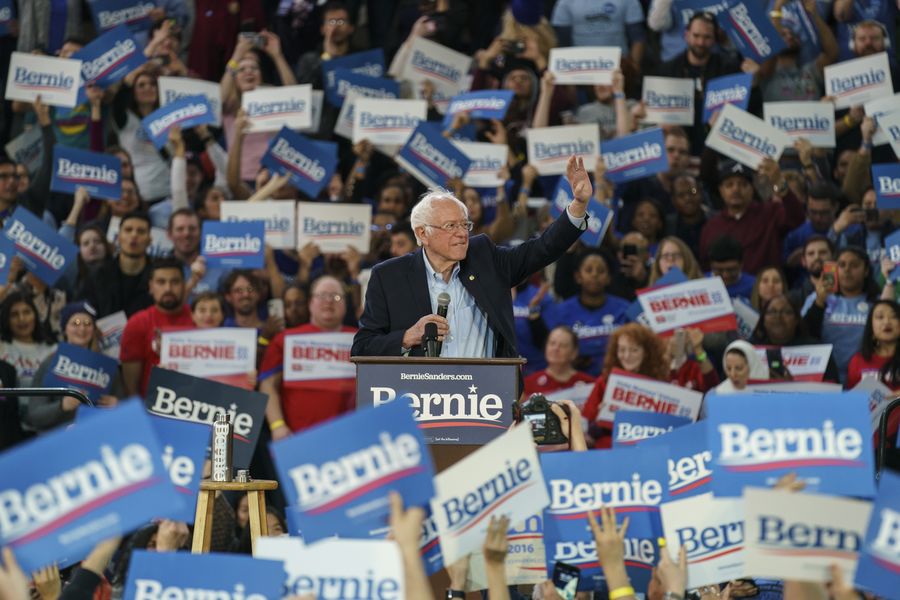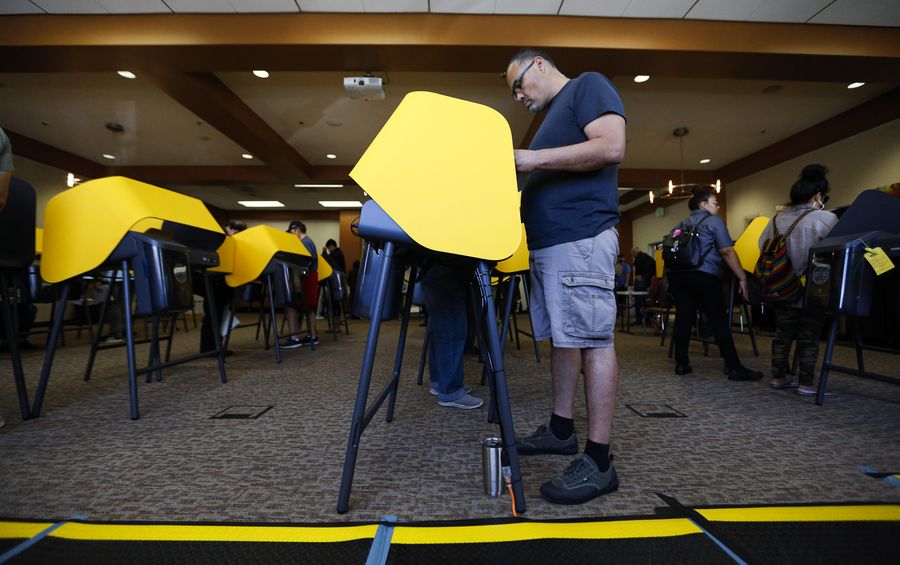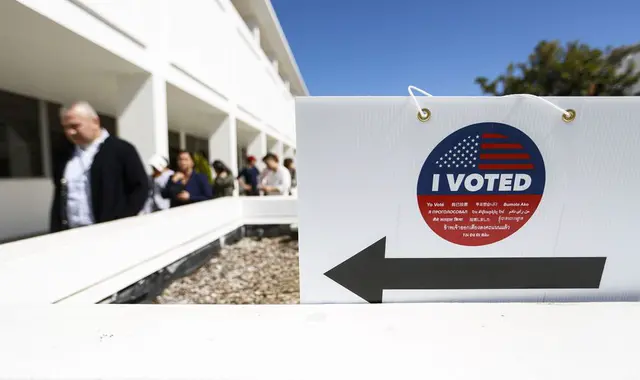Fights between the Democratic Party's progressive bloc and its moderate group have dominated primaries since the beginning.
WASHINGTON, March 4 (Xinhua) -- A two-way race between former U.S. Vice President Joe Biden and Senator Bernie Sanders is taking shape after the so-called "Super Tuesday" primaries of the 2020 presidential election.
Biden, after a strong comeback in South Carolina's Democratic primary late February that triggered a wave of big-name endorsements, rode on the momentum and has been projected to win the most states on Tuesday.
Sanders also has gotten something to celebrate as he has been projected to win populous California, a state with the most pledged delegates to July's Democratic National Convention (DNC) in Milwaukee, Wisconsin.
Voters line up to cast ballots at a polling station in Los Angeles, California, the United States, March 3, 2020.(Xinhua/Li Ying)
TWO-WAY RACE
As a 77-year-old moderate political veteran, Biden has been seen as a winner in at least nine of 14 Super Tuesday states, according to projections by several U.S. media outlets.
Biden's victories included Texas, North Carolina, Virginia, and Massachusetts, where he defeated Sanders and Senator Elizabeth Warren.
"It's a good night," Biden triumphantly told supporters at a rally in Los Angeles, California, on Tuesday night. "It seems to be getting better. They don't call it Super Tuesday for nothing."
David Axelrod, director of the University of Chicago's Institute of Politics, called it an "amazing night no one would have predicted even days ago" in a tweet.
Axelrod attributed it to Biden's landslide victory in South Carolina, which was "intensified by timely exits and endorsements" of Pete Buttigieg, former mayor of South Bend, Indiana and Senator Amy Klobuchar of Minnesota.

Democratic presidential candidate Joe Biden, former U.S. vice president, attends a caucus night rally with his wife Jill Biden at Drake University in Des Moines, Iowa, the United States, Feb. 3, 2020. (Photo by Joel Lerner/Xinhua)
Sanders, a 78-year-old progressive and longtime Independent, has taken four states, including the biggest prize of the night in California. He also won Colorado, Utah, and his home state of Vermont.
Speaking to supporters in Vermont, Sanders said his campaign has been "taking on the political establishment."
"We're going to win because the people understand it is our campaign, our movement," he said. "What we need is a new politics that brings working-class people into our political movement."
Projections of a winner for Maine have not been announced.
"After Super Tuesday, we are likely to have a de facto two-person race between Biden and Sanders," Darrell West, director of governance studies at Brookings Institution, a Washington D.C.-based think tank, told Xinhua.

U.S. Democratic Presidential candidate Bernie Sanders attends a campaign rally in Springfield, Virginia, the United States, on Feb. 29, 2020. (Photo by Ting Shen/Xinhua)
PROGRESSIVE-MODERATE TUSSLE
Fights between the Democratic Party's progressive bloc and its moderate group have dominated primaries since the beginning.
Even on Super Tuesday, voters remain divided.
In Texas, Samantha Lynn Deal told Xinhua that she supports Sanders, a champion of the progressive Medicare for All plan, a single-payer, national health insurance program.
"I think mostly because I really want an upheaval of the health care system," Deal said. "I don't believe that the system that we're currently using is going to work for the future. And I think that we need a major change."
She also said she thinks the idea of making public colleges and universities tuition-free, another of Sanders's signature proposals, is "fantastic," but also admitted that she does not know "if that's going to be feasible."

U.S. Democratic presidential candidate and Senator Elizabeth Warren of Massachusetts speaking during an interview after the Democratic Party's ninth presidential debate in Las Vegas, Nevada, the United States, Feb. 19, 2020.
"Younger voters love Sanders," Christopher Galdieri, associate professor of politics at Saint Anselm College in New Hampshire, told Xinhua.
"We've seen him moderate his tone somewhat lately," Galdieri said. "I think all of this is aimed at the broader Democratic electorate he'll need if he's the nominee."
Clyde Fleet, a supporter of moderate Democrats, said that Sanders's proposals sound good but "the money has to come from somewhere."
Nancy Cooney from Boston, Massachusetts, said that she supports Biden and that she feels like Biden is the "best person positioned to unite the Democratic Party."
At a polling place in Arlington, Virginia, on Tuesday, Max Blake said that he was aware of an ongoing tussle between the two wings but believes they will eventually come together for the race against sitting President Donald Trump.

Voters cast ballots at a polling station in Los Angeles, California, the United States, March 3, 2020.(Xinhua/Li Ying)
WHAT'S NEXT?
Trump said he does not care who the Democratic nominee is, when asked which one he prefers to face.
"Whoever it is, we will take them on," he said at the White House before leaving for an event on Tuesday.
Faced with no major challengers in the Republican Party, Trump is expected to win the GOP primaries on Tuesday.
In a series of tweets on Tuesday night, Trump celebrated his victory while lashing out at some of the Democratic presidential contenders, including former New York City Mayor Michael Bloomberg.
Bloomberg, who has spent over 500 million U.S. dollars on advertising, has been projected to win only American Samoa in Super Tuesday's Democratic primaries, raising speculation that he will drop out.
"If he got behind the party, rather than himself, he could become a game changer in November," tweeted Julian Zelizer, professor of history and public affairs at Princeton University, on Tuesday night.
Warren, after losing her home state of Massachusetts to Biden, told supporters to look ahead in an email, as six other states will hold primaries on March 10.
The Democratic primaries on Super Tuesday are deciding over 1,300 pledged delegates to the DNC or roughly a third of the total. Typically, a candidate is only eligible to receive a share of the pledged delegates at stake if they win at least 15 percent of the vote cast in a primary or caucus.
To win the Democratic presidential nomination, a candidate must receive support from a majority of all the 3,979 pledged delegates on the first ballot of the national convention: 1,991 delegates.
The Republican Party is expected to nominate Trump for a second term during August's national convention in Charlotte, North Carolina.
The 2020 U.S. presidential election will take place on Nov. 3.
(Video reporters: Sun Ding, Tan Yixiao, Jin Yuelei, Hu Yousong, Gao Lu; Video editor: Wu Yao)■
 简体中文
简体中文

